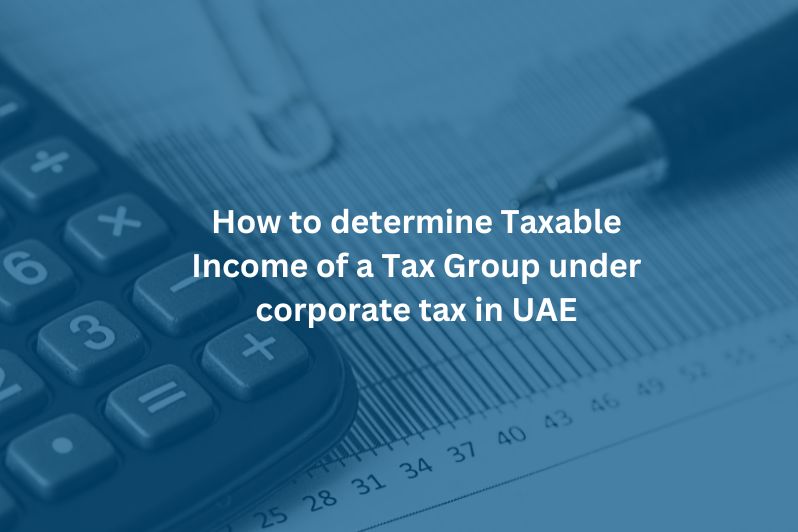Determining the taxable income of a Tax Group under UAE Corporate Law is essential in ensuring the consolidation of taxable income within a group structure. Article 42 of the UAE Corporate Tax Law outlines the criteria for the formation of a Tax Group, a legal entity that consolidates financial outcomes, assets, and liabilities, ultimately resulting in a unified taxable income. This formation significantly impacts how corporate entities are assessed for corporate tax liabilities, and it has been crafted to ensure fairness and transparency in the tax framework.
How to determine a Tax Group?
- Computation of Consolidated Taxable Income: Article 42(1) of the UAE Corporate Tax Law sets a duty on the Parent Company to combine the financial outcomes, assets, and liabilities of each Subsidiary within the relevant Tax Period. Essentially, when compiling consolidated financial statements in accordance with this clause, it is significant to comply with specified accounting standards. The taxable income threshold, as defined in Article 3(1) of the law, applies collectively to the consolidated taxable income of the Tax Group, rather than being assessed on each individual member. This mechanism provides a holistic view of the financial status of the Tax Group by eliminating internal transactions and offering a consolidated financial overview.
- Harmonizing Accounting Standards: It is a mandatory requirement for the Tax Group to prepare consolidated financial statements in compliance with specific accounting standards. This ensures that the financial information presented accurately reflects the correct financial position of the Tax Group, thereby fostering transparency and accountability in financial reporting.
- Shifting Taxation to the Group Level: This clause is applicable to the Tax Group as an integrated entity, rather than assessing individual members separately. This significant change underscores the UAE's commitment to simplifying tax compliance and streamlining assessment procedures, aiming to enhance the efficiency of the tax system.
- Balancing Commencement and Delimitation: The formation of a Tax Group aligns with the commencement of a Tax Period, as per the law's provisions. The statute prevents the retrospective consolidation of Tax Losses, ensuring that pre-grouping Tax Losses from one Subsidiary cannot offset the Taxable Income of other members. This provision maintains fairness while upholding the integrity of the Tax Group structure.
- Efficient Use of Tax Losses: Clause 4 addresses scenarios where a new Subsidiary joins an existing Tax Group, preventing them from leveraging unutilized Tax Losses of the existing group to offset their own Taxable Income. This provision ensures that Tax Losses are utilized as originally intended when forming the Tax Group, promoting equitable taxation.
- Adherence to Tax Loss Provisions: It's crucial to note that the utilization of pre-grouping Tax Losses or Tax Losses within the Tax Group, as outlined in Clause 4, must align with the provisions set out in Articles 37 and 39 of the Corporate Tax Law, ensuring consistency within the overall tax framework
- Preserving Tax Loss Continuity: Clause 6 of Article 42 addresses scenarios where a Subsidiary departs from a Tax Group, allowing pre-grouping Tax Losses attributable to the departing Subsidiary to remain within their purview. This provision safeguards the integrity of Tax Losses while enabling departing members to maintain their historical tax positions.
- Disbanding the Tax Group: Allocation of Tax Losses: The dissolution of a Tax Group raises questions about unutilized Tax Losses. Clause 7 provides clarity: If the Parent Company remains taxable, unutilized Tax Losses stay within the Parent Company's balance sheet. Nonetheless, in the event that the Parent Company no longer holds tax liability, any unused Tax Losses cannot be used to offset the forthcoming earnings of individual Subsidiaries, with the exception of Tax Losses incurred prior to forming the Tax Group. Importantly, Clause 8 ensures a seamless transfer of Tax Losses within the Tax Group when a new Parent Company is designated, as per Article 40(12).
- Managing Intra-Group Transactions: Preventing Indirect Sales: While most intra-group transactions don't affect Taxable Income calculations, Clause 9 introduces an exception: if assets or liabilities are transferred between members, and either party exits the Tax Group within two years, any taxable gain or loss from the transfer becomes part of the Taxable Income. This provision prevents circumventing the law through indirect sales and ensures equitable taxation.
- Implications of Transactions and Adjustments: Clause 10 underscores the implications of transactions within the Tax Group, accounting for Taxable Income linked to such transactions upon the departure of involved members. Furthermore, this action initiates necessary modifications to the cost basis for Corporate Tax valuation of the relevant asset or liability. This process contributes significantly to the achievement of equitable and precise tax evaluation
Read more: Tax Group Formation Under the UAE Corporate Tax Regime
Seek the expert services of top Tax Consultants in the UAE
Article 42 of the corporate tax law outlines the mechanisms for consolidating and allocating Taxable Income within a Tax Group, striking a balance between corporate intricacies and the necessity for equitable taxation. The UAE's dedication to transparency, fairness, and compliance is evident in the careful crafting of this article. As the UAE continues to refine its taxation framework to meet international standards. Thus, Taxable Persons are advised to seek the expert services of Tax Consultants in Dubai to effectively ensure compliance with the corporate Tax Law. Therefore, contact us and we shall be glad to assist you.
